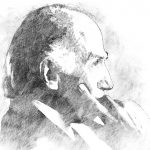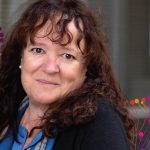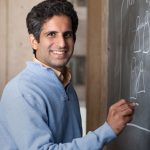When mice with atopic dermatitis—a common type of allergic skin inflammation—are treated with drugs that target the immune system, their thickened, itchy skin generally heals quickly. Yet the same treatment in obese mice only worsens their skin, according to a study by Professor Ronald Evans, Associate Professor Ye Zheng and collaborators from Gladstone Institutes and UC San Francisco. Obesity changes the molecular underpinnings of allergic inflammation, both in mice and humans, the team found. Their study demonstrates how obesity can change the immune system and how available drugs might be able to improve health outcomes for people with obesity.
Read News ReleaseMetabolism
The protein that keeps the pancreas from digesting itself
Every day, your pancreas produces about one cup of digestive juices, a mixture of molecules that can break down the food you eat. But if these powerful molecules become activated before they make their way to the gut, they can damage the pancreas itself—digesting the very cells that created them, leading to the painful inflammation known as pancreatitis and predisposing a person to pancreatic cancer. Now, Professor Ronald Evans, co-first author Tae Gyu Oh and colleagues have discovered that a protein called ERR gamma plays a crucial role in preventing pancreatic autodigestion in mice. What’s more, they discovered that people with pancreatitis have lower levels of this protein in cells affected by inflammation.
Read News ReleaseWhy hungry worms take risks
Whether it’s making rash decisions or feeling grumpy, hunger can make us think and act differently—“hangry,” even. But little is known about how hunger signals in the gut communicate with the brain to change behavior. Associate Professor Sreekanth Chalasani, co-first author Molly Matty and colleagues are using worms as a model to examine the molecular underpinnings that help explain how hunger makes an organism sacrifice comfort and make risky decisions to get a meal. Their latest findings reveal that proteins in intestinal cells move dynamically to transmit signals about hunger, ultimately driving worms to cross toxic barriers to reach food. Similar mechanisms may also occur in humans and could explain how we prioritize basic needs over comfort.
Read News ReleaseFeatured Stories
 What’s so special about Salk? Everything.An exceptional history, visionary design and trailblazing faculty make the Salk Institute unique among elite research institutions. And we’re just getting started. Today, Salk faculty are daily making discoveries that may one day turn the tide on Alzheimer’s, aging, cancers, climate change and more.
What’s so special about Salk? Everything.An exceptional history, visionary design and trailblazing faculty make the Salk Institute unique among elite research institutions. And we’re just getting started. Today, Salk faculty are daily making discoveries that may one day turn the tide on Alzheimer’s, aging, cancers, climate change and more. Margarita Behrens—Master of brain circuitsGrowing up in Chile, Research Professor Margarita Behrens was torn between becoming an architect and a scientist. She ultimately decided to pursue biochemistry. Now at Salk, Behrens studies how neurons develop in the brain. Her findings have implications for neurodevelopmental disorders such as schizophrenia and autism.
Margarita Behrens—Master of brain circuitsGrowing up in Chile, Research Professor Margarita Behrens was torn between becoming an architect and a scientist. She ultimately decided to pursue biochemistry. Now at Salk, Behrens studies how neurons develop in the brain. Her findings have implications for neurodevelopmental disorders such as schizophrenia and autism.
 Julie Auger—Shaping Salk’s science through shared resourcesJulie Auger’s mother was at a conference in the mid-1980s when she met Jonas Salk. She got his autograph and mailed it to Auger with a note saying, “Don’t ever stop trying to achieve your dreams.” Auger took her mom’s advice, and today she is the executive director of Research Operations at the Salk Institute.
Julie Auger—Shaping Salk’s science through shared resourcesJulie Auger’s mother was at a conference in the mid-1980s when she met Jonas Salk. She got his autograph and mailed it to Auger with a note saying, “Don’t ever stop trying to achieve your dreams.” Auger took her mom’s advice, and today she is the executive director of Research Operations at the Salk Institute. Gaurav Mendiratta— Using math to solve cancerJumping from theoretical physics to cancer research with no prior training in biological sciences wasn’t an easy transition for Gaurav Mendiratta. Couple this with a move across the world and the birth of his first child shortly after starting his postdoctoral training in a newly opened laboratory—Mendiratta had his work cut out for him.
Gaurav Mendiratta— Using math to solve cancerJumping from theoretical physics to cancer research with no prior training in biological sciences wasn’t an easy transition for Gaurav Mendiratta. Couple this with a move across the world and the birth of his first child shortly after starting his postdoctoral training in a newly opened laboratory—Mendiratta had his work cut out for him. A trailblazer’s lasting legacy: Ursula Bellugi bridged humanity and scienceDespite being a world-renowned, award-winning scientific pioneer, Distinguished Professor Emerita Ursula Bellugi didn’t like to say she was smart. Instead, she credited her tremendous success to her insatiable curiosity and her willingness to ask the right questions. This past spring, the world lost a true trailblazer.
A trailblazer’s lasting legacy: Ursula Bellugi bridged humanity and scienceDespite being a world-renowned, award-winning scientific pioneer, Distinguished Professor Emerita Ursula Bellugi didn’t like to say she was smart. Instead, she credited her tremendous success to her insatiable curiosity and her willingness to ask the right questions. This past spring, the world lost a true trailblazer.






















































